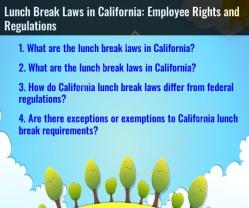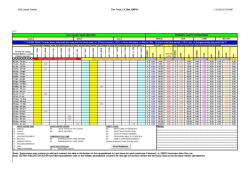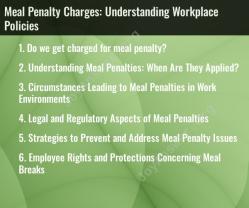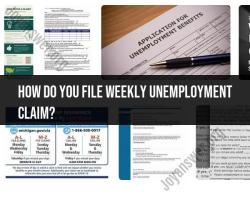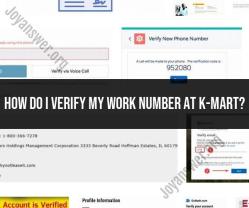When should an employer reimburse for mileage?
Employers typically reimburse employees for mileage when they are required to use their personal vehicles for work-related activities. The appropriateness of mileage reimbursement depends on the nature of the job, the specific tasks involved, and company policies. Here are some common situations in which it is appropriate for an employer to reimburse employees for mileage:
Business Travel: When employees are required to travel for business purposes, whether it's to attend meetings, visit clients, or make deliveries, mileage reimbursement is appropriate. This includes both short trips within the local area and longer trips that may require overnight stays.
Sales and Client Visits: Salespeople and employees who regularly visit clients or customers often use their personal vehicles to travel to different locations. In such cases, mileage reimbursement is customary.
Service Calls: Technicians, repair personnel, and service providers who need to travel to customers' locations for repairs, installations, or maintenance should be reimbursed for the miles they put on their vehicles.
Commuting to Multiple Locations: If an employee's job requires them to commute to multiple work locations throughout the day, and it's not a regular or fixed commute, mileage reimbursement may be necessary.
Errands and Supplies: If an employee is asked to run work-related errands or pick up supplies or equipment using their personal vehicle, they should be reimbursed for the mileage incurred during these tasks.
Special Projects and Training: When employees are required to participate in special projects, training sessions, or workshops that are not at their usual workplace, mileage reimbursement may be provided.
Home Office Workers: Some companies reimburse remote or home office workers for mileage when they occasionally visit the main office or other work-related locations.
Non-Exempt Employees: For non-exempt employees (those eligible for overtime pay), mileage reimbursement should be provided if their travel is required outside of their regular working hours.
Industry and Legal Requirements: In some industries and regions, there may be legal or regulatory requirements that mandate mileage reimbursement under specific circumstances. Employers should comply with these requirements.
It's essential for employers to establish clear mileage reimbursement policies that specify the reimbursement rate per mile, the documentation required, and the procedures for submitting mileage claims. Many employers use the standard mileage rate set by the Internal Revenue Service (IRS) as a guideline for calculating reimbursement rates.
Reimbursement for mileage is not typically provided for an employee's regular commute between home and their primary workplace, as this is considered a personal expense. However, exceptions may apply if an employee is required to travel directly from home to a temporary work location.
Employers should communicate their mileage reimbursement policies to employees and ensure they have a fair and transparent process in place for tracking and reimbursing mileage expenses.
Mileage Reimbursement: When Should Employers Provide It?
Employers should provide mileage reimbursement to employees when they use their personal vehicles for business purposes. This includes driving to and from customer appointments, work sites, and other business-related destinations.
Employers are not legally required to provide mileage reimbursement, but it is a best practice. Reimbursing employees for their mileage expenses shows that the company values their employees and their time. It also helps to ensure that employees are not out of pocket for using their personal vehicles for work.
The Decision-Making Process for Mileage Reimbursement
When deciding whether or not to provide mileage reimbursement, employers should consider the following factors:
- The type of work that employees do: If employees are required to use their personal vehicles for business purposes on a regular basis, then the employer should provide mileage reimbursement.
- The cost of mileage reimbursement: Employers should calculate the estimated cost of mileage reimbursement before making a decision. This cost will vary depending on the number of employees who use their personal vehicles for business purposes and the distance that they travel.
- The company's budget: Employers should also consider their budget when making a decision about mileage reimbursement. If the company cannot afford to provide mileage reimbursement, then it may need to find other ways to compensate employees for their travel expenses.
Setting Mileage Reimbursement Standards in Companies
Once an employer has decided to provide mileage reimbursement, they need to set standards for how much they will reimburse employees. There are two main ways to set mileage reimbursement standards:
- The standard mileage rate: The standard mileage rate is set by the IRS each year. It is based on the average cost of operating a vehicle. Employers can choose to reimburse employees at the standard mileage rate or at a higher rate.
- The actual cost of mileage: Employers can also choose to reimburse employees for the actual cost of mileage. This means that employees would need to keep track of their mileage expenses and submit them to the company for reimbursement.
Balancing Employee Benefits and Business Costs
When setting mileage reimbursement standards, employers need to balance the needs of their employees with the costs to the business. Employers want to reimburse employees fairly, but they also need to ensure that the cost of mileage reimbursement is sustainable for the business.
Employers can use a variety of tools to balance employee benefits and business costs. For example, employers can use mileage reimbursement policies that cap the amount of reimbursement that an employee can receive each month or year. Employers can also use mileage reimbursement policies that exclude certain types of travel from reimbursement, such as commuting expenses.
Mileage Reimbursement Best Practices for Employers
Here are some mileage reimbursement best practices for employers:
- Create a clear and concise mileage reimbursement policy: The mileage reimbursement policy should clearly state who is eligible for reimbursement, what types of travel are eligible for reimbursement, and how much reimbursement will be provided.
- Make it easy for employees to submit mileage reimbursement requests: Employers should provide employees with an easy way to submit mileage reimbursement requests. This can be done through a web portal, email, or paper forms.
- Reimburse employees promptly: Employers should reimburse employees for their mileage expenses promptly. This will help to ensure that employees are not out of pocket for using their personal vehicles for work.
By following these best practices, employers can create a mileage reimbursement program that is fair to employees and affordable for the business.



